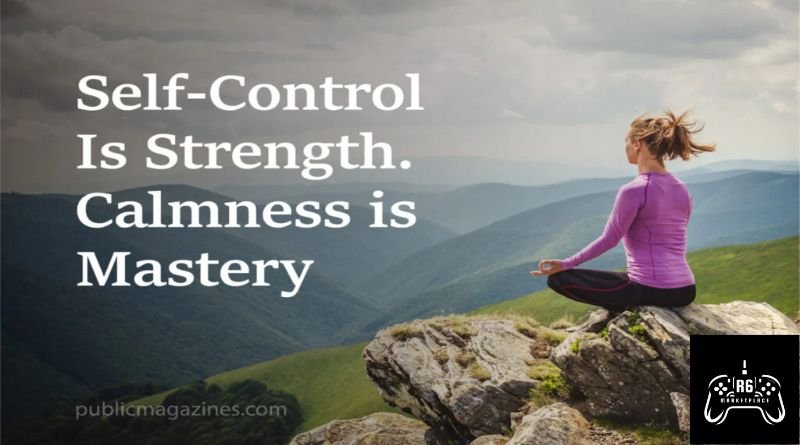Self-control and calmness are two of the most powerful qualities an individual can develop. In a fast-paced world filled with distractions, emotional turbulence, and countless challenges, mastering self-discipline and maintaining a sense of inner peace can set you apart. The phrase “Self-control is strength. Calmness is mastery. You – Tymoff” beautifully encapsulates the essence of personal development and mental resilience.
In this article, we will explore the significance of self-control and calmness, how they impact your life, and practical ways to cultivate these traits.
The Power of Self-Control: A Foundation for Strength
Self-control is the ability to regulate emotions, thoughts, and behaviors in the face of temptations and impulses. It is the foundation of strength, allowing individuals to stay disciplined, make wise decisions, and achieve long-term goals.
Why Is Self-Control Important?
- Enhances Decision-Making – When emotions are controlled, individuals can think rationally and make better choices.
- Improves Focus and Productivity – Discipline prevents distractions and helps you stay committed to tasks.
- Strengthens Relationships – By managing impulses, conflicts can be avoided, fostering healthier interactions.
- Encourages Financial Stability – Practicing self-control helps in budgeting and avoiding impulsive spending.
- Promotes Physical and Mental Health – Resisting unhealthy habits, such as junk food or excessive screen time, leads to a healthier lifestyle.
How to Develop Self-Control
- Set Clear Goals – Define what you want to achieve and break it down into manageable steps.
- Practice Delayed Gratification – Train yourself to wait for rewards rather than seeking instant pleasure.
- Develop a Routine – Establishing habits reduces reliance on willpower and enhances discipline.
- Avoid Temptation – Recognize triggers and create an environment that supports self-control.
- Engage in Mindfulness Practices – Being aware of your thoughts and emotions helps in managing reactions effectively.
Self-control empowers individuals to take charge of their lives, ensuring that decisions are based on logic rather than fleeting emotions.
Calmness: The Ultimate Form of Mastery
Calmness is often mistaken for passivity, but in reality, it is a sign of mastery over one’s emotions and reactions. It is the ability to stay composed, especially in challenging or stressful situations.
Why Is Calmness Essential?
- Reduces Stress and Anxiety – A calm mind prevents overreaction and reduces unnecessary worry.
- Enhances Problem-Solving Abilities – Composure allows for clearer thinking and better solutions.
- Improves Communication – Responding with patience rather than aggression fosters better relationships.
- Boosts Resilience – Staying calm in adversity helps in bouncing back from failures.
- Increases Emotional Intelligence – Understanding and managing emotions improve overall well-being.
Ways to Cultivate Calmness
- Practice Deep Breathing – Controlled breathing can instantly reduce stress and promote relaxation.
- Adopt a Meditation Routine – Mindfulness meditation trains the mind to remain calm under pressure.
- Engage in Regular Exercise – Physical activity helps in managing stress hormones and promotes mental clarity.
- Develop a Positive Mindset – Reframing negative thoughts can significantly impact emotional stability.
- Limit Exposure to Negativity – Reducing interaction with toxic environments or individuals helps maintain inner peace.
Mastering calmness does not mean suppressing emotions but rather learning how to channel them constructively.
The Interplay Between Self-Control and Calmness
Self-control and calmness are deeply interconnected. Without self-control, staying calm becomes a challenge, and without calmness, self-control weakens in difficult situations. Together, they form the foundation of a well-balanced and resilient mind.
How Self-Control Supports Calmness
- Prevents impulsive reactions, ensuring rational responses to situations.
- Reduces stress by allowing individuals to manage their emotions effectively.
- Enhances patience, leading to better interactions and reduced conflicts.
How Calmness Reinforces Self-Control
- Provides mental clarity, making it easier to stay disciplined.
- Encourages thoughtful decision-making rather than acting on impulse.
- Reduces emotional fatigue, allowing for greater control over actions and reactions.
By strengthening both these qualities, individuals can navigate life’s challenges with greater ease and confidence.
Real-Life Examples of Self-Control and Calmness
Successful Leaders and Entrepreneurs
Many successful individuals attribute their achievements to self-discipline and a composed mindset. Leaders like Elon Musk, Warren Buffett, and Bill Gates have demonstrated remarkable self-control in their decision-making and the ability to remain calm under immense pressure.
Athletes and Performers
Professional athletes practice self-control to maintain their training schedules and resist distractions. Serena Williams and Michael Jordan are great examples of individuals who have mastered the art of staying calm in high-stress situations, ensuring peak performance.
Monks and Philosophers
Buddhist monks and great thinkers like Marcus Aurelius and Dalai Lama have emphasized the importance of inner peace and discipline in achieving personal and spiritual growth.
These examples showcase how mastering self-control and calmness leads to success in various fields.
How You Can Apply These Principles in Daily Life
At Work
- Prioritize tasks and avoid distractions.
- Respond to criticism with composure rather than defensiveness.
- Stay disciplined in meeting deadlines and responsibilities.
In Relationships
- Practice active listening rather than reacting emotionally.
- Manage disagreements with patience and understanding.
- Avoid unnecessary arguments by choosing battles wisely.
For Personal Growth
- Set long-term goals and resist short-term temptations.
- Cultivate a daily meditation or mindfulness routine.
- Engage in activities that enhance mental and emotional resilience.
By integrating these practices, you can transform your mindset and lead a more fulfilling life.
Conclusion
The phrase “Self-control is strength. Calmness is mastery. You – Tymoff” serves as a timeless reminder of the power we hold over our emotions and reactions. In a world where impulsivity and emotional instability can lead to regrettable decisions, mastering self-discipline and maintaining inner peace set the foundation for a successful and meaningful life.
By developing self-control, you gain the strength to overcome challenges. By cultivating calmness, you master the art of handling life’s uncertainties. Together, these traits enable you to navigate the world with confidence, wisdom, and resilience.
Embrace these principles, and you will unlock your full potential. The power lies within you. You are in control.
May Also Read: r6marketplace

